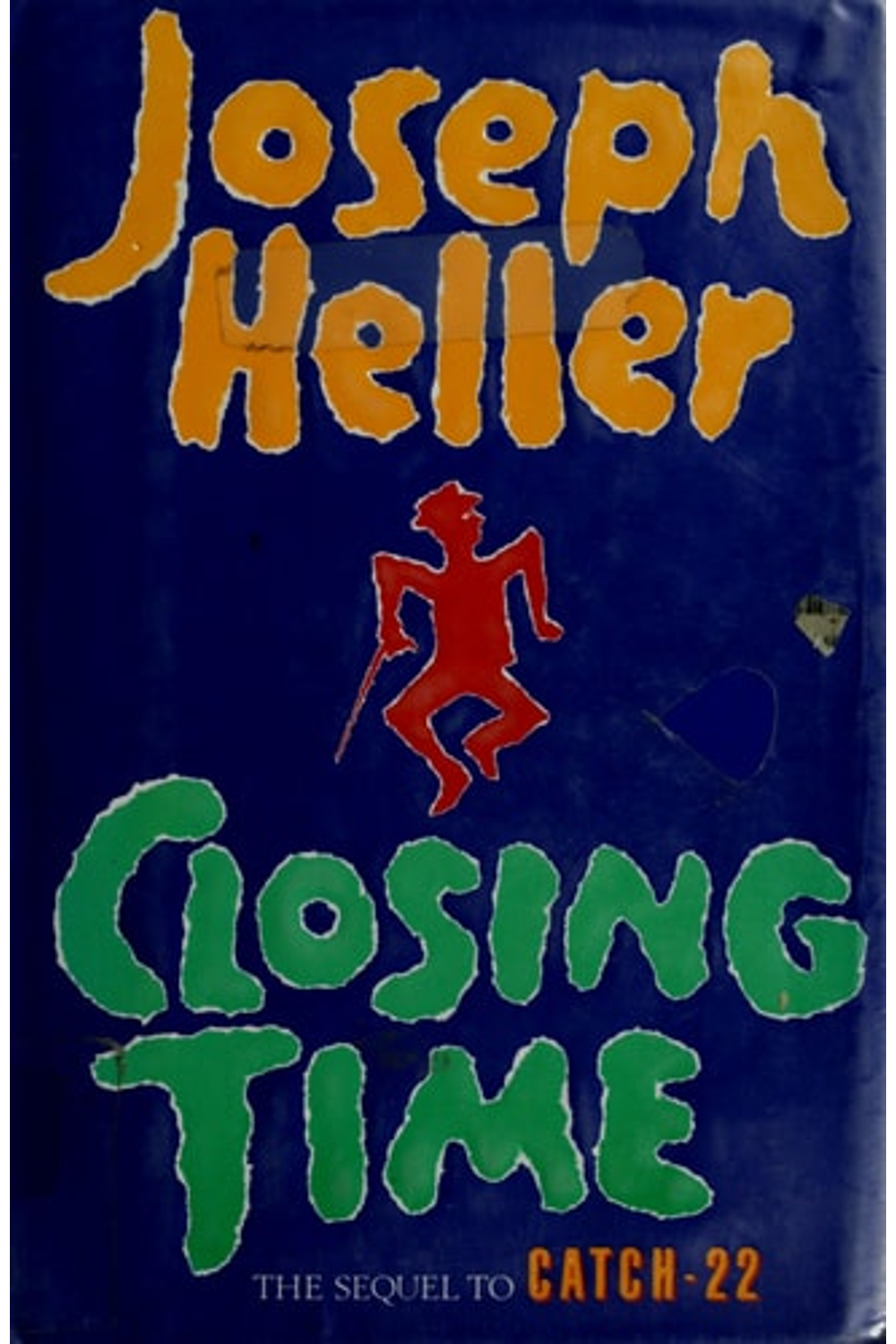“Closing Time” by Joseph Heller: A dark comedy and sequel to Catch-22 Revisit the absurd world of Joseph Heller in “Closing Time,” the highly anticipated sequel to his classic novel “Catch-22”. Decades after the events of World War II, Heller brings back beloved characters like Yossarian and Milo Minderbinder, now grappling with aging and the complexities of late 20th-century America. Published in 1994, “Closing Time” delivers Heller’s trademark satire, skewering the hypocrisy and madness of American society, from its politics to its corporations. This comic masterpiece confronts themes of mortality, societal decay, and the lingering impact of war on individuals long after the battles end. Explore this darkly humorous and poignant novel, a first edition hardcover from Simon & Schuster. “Closing Time” offers a unique and unsettling reflection of the American experience, inviting readers to laugh at the absurdity while contemplating the deeper truths beneath the surface.
Closing Time
18,16 $
In stock
Product Description
Thirty-three years and over ten million copies later…the classic story continues. Yossarian returns — older, if not wiser — to face a new foe. An instant classic when published in 1961, Joseph Heller’s “Catch-22” still ranks among the funniest — and most serious — novels ever written about war. Now Heller has dared to write the sequel to his 10-million copy bestseller, using many of “Catch-22″‘s characters to deftly satirize the realities and the myths of America in the half century since they fought World War II. In “Closing Time,” a comic masterpiece in its own right, Heller spears the inflated balloons of our national consciousness — the absurdity of our politics, the decline of society and our great cities, the greed and hypocrisy of our business and culture — with the same ferocious humor that he used against the conventional view of warfare. Back again are characters familiar from “Catch-22,” including Yossarian and Milo Minderbinder, the chaplain, and little Sammy Singer, as they come to the end of their lives and the end of the century — all linked, this time, in uneasy peace and old age…fighting not the Germans, but The End. Outrageously funny and totally serious, and as brilliant and successful as “Catch-22” itself, “Closing Time” is a fun-house mirror that captures, at once grotesquely and accurately, the truth about ourselves.
From Publishers Weekly
Worked on for many years and long anticipated (and perhaps dreaded) by admirers of the incomparable original, Heller’s “sequel” shares with his great WWII saga a surreal sense of the absurd and of the fatuity of most human institutions. But it is hard to avoid a sense of keen disappointment, nonetheless. The satirizing of American contemporary life has been done so frequently-and often successfully-since the 1961 Catch-22, which helped make so much of that satirizing possible, that Heller is in effect competing with himself, and failing. Here again are John Yossarian, Milo Minderbinder, Sammy Singer, Chaplain Albert Tappman, and the giant Lew. Newcomers include Washington finagler G. Noodles Cook and the mysterious and ubiquitous know-it-all Jerry Gaffney. The wartime buddies are old men now, worried about their health, their sex lives and their children, but they find 1990s civilian life as corruptly absurd as the old Air Force days. There are flashbacks to the war, some of which recall the power of Heller’s original inspiration; there are nostalgic passages about Coney Island, long Jewish dialogues that could have been penned by a whacked-out Neil Simon, bravura passages (notably, a magnificent wedding reception held at New York’s Port Authority Bus Terminal) and hare-brained Pentagon meetings to discuss the new Shhhh super-quiet warplane. There are patches of vaudeville, dreamscapes, far too much sophomoric doodling, and longueurs when Heller seems simply to be filling pages. In the end, despite flashes of the old wit and fire, this is a tired, dispirited and dispiriting novel. 200,000 first printing; first serial to Playboy.
Copyright 1994 Reed Business Information, Inc.
About the Author
Joseph Heller lives with his wife in East Hampton, New York.
Excerpt. Reprinted by permission. All rights reserved.
Chapter 1
Sammy
When people our age speak of the war it is not of Vietnam but of the one that broke out more than half a century ago and swept in almost all the world. It was raging more than two years before we even got into it. More than twenty million Russians, they say, had perished by the time we invaded at Normandy. The tide had already been turned at Stalingrad before we set foot on the Continent, and the Battle of Britain had already been won. Yet a million Americans were casualties of battle before it was over — three hundred thousand of us were killed in combat. Some twenty-three hundred alone died at Pearl Harbor on that single day of infamy almost half a century back — more than twenty-five hundred others
| Authors | |
|---|---|
| Binding | |
| Condition | |
| ISBN-10 | 0671719076 |
| ISBN-13 | 9780671719074 |
| Language | |
| Pages | 464 |
| Publisher | |
| Year published | |
| Weight | 840 |
| Edition | 1st |
| Dewey decimal | 813.54 |
Related products
The Salesman
15,12 $
- Additional information
- Currencies
- USD – United States dollar
- EUR – Euro
- GBP – Pound sterling
- CNY – Chinese yuan
- BRL – Brazilian real
- MXN – Mexican peso
- JPY – Japanese yen
- PHP – Philippine peso
- THB – Thai baht
- PLN – Polish złoty
- CAD – Canadian dollar
- MYR – Malaysian ringgit
- AUD – Australian dollar
- TWD – New Taiwan dollar
- CZK – Czech koruna
- SEK – Swedish krona
- HUF – Hungarian forint
- ILS – Israeli new shekel
- CHF – Swiss franc
- HKD – Hong Kong dollar
- DKK – Danish krone
- SGD – Singapore dollar
- NOK – Norwegian krone
- NZD – New Zealand dollar





